新概念英语第一册Lesson 133 Sensational news
新概念第一册(1)133-134课

D B
B
.
Thank you!
.
They. said that
III.将下列句子变成“一般疑问句“(注意时态) 1. She is sleeping at home. 2. He can ride a bike. 3. Paul likes swimming. 4. She often does her housework in the morning. 5. I played basketball yesterday. 6. It is going to rain this afternoon. 7. Lucy was at school last Monday. 8. He watched TV last night.
3. Mink coat /miŋk/ [miŋk] 貂皮大衣
.
★wonder = want to know 后面常跟由特殊疑问词(why/ what/who/where/when/how等) 组成的句子
I wonder why. I wonder who Yang mi is.
★arrive in(大地方)/ arrive at(小地方)
★当动词所表示的状态或或动作在引述时仍在继续时 : “I’m forty,” heisaid. →He said he ___ forty. 他说他40了。
★当引述的是客观事实,科学真理及格言等: He said, “the sky is blue.” →He said the sky __i_s_ blue.
II.将下列句子变成间接引语 1. Tom said,“I’m watching TV.”
Tom said that 2. He said,“I’ve lost my bike.”
新概念一133课

133. Sensational news! 爆炸性新闻!REPORTER: Have you just made a new film, Miss Marsh?记者助v. 已完成拍电影的拍用make ,make a film ;现在完成的已完成MISS MARSH: Yes, I have.(just made a new film )马什小姐REPORTER: Are you going to make another? 又一部,不定pron. be going to do 现在进行表将来,不能用will you 此处表有计划有准备MISS MARSH: No,I’m not.(going to make another)I’m going to retire.退休I feel very tired. feel:系v. ;tired adj. 主系表结构to make another由此句可知,千万不能根据时间状语来辨别是何种时态。
(只有一般过去式,可以通过时间状语来辨别时态)KATE: Let’s buy a newspaper, Liz.凯特let usListen to this!Listen 听,是不及物vi.,及物动词vt.直接带的语也可不带主+谓vi+介词+宾语‘Karen Marsh: Sensational News!方式介词Karen Marsh arrived at London Airport today.一般过去式at + 具体地点/ in+模糊大地点。
was 强调穿的状态。
过去进行和现在完成、过去完成都经常出现在报纸、杂志、新闻摘要和各种评论之中。
she had just made a new film. 间接引语直接引语一随主,1.直接引语变来的间接引语2.作间接宾语的宾语从句; had made过去完成(同色的名子变来)She said直接作said宾语的宾语从句由 I’m not.(going to make another)直接引语变来。
新概念一册lesson133

2. “Do you want to try it?” Tom’s mother asked him.
Tom’s mother asked him if he wanted to try it.
3. Mike asked: “ Where does Tina live?”
me that he wanted to have a long holiday then . He said that he hadn’t done anything he wanted to do .
he wasn’t going to record any more songs that year . He said that someone had asked him to be in a film the next year .
• 当从句说明的是一般真理 / 客观事实, 运用一般 现在时。
• She said to me, ‘Please have a rest.’ • She asked me to have a rest.
• 直接引语为祈使句时,间接引语用动词不定式,句中please 去掉。
• ‘What a clever boy you are!’ my teacher said to him. • My teacher told him what a clever boy he was. • = My teacher told him that he was a clever boy.
• She told me she had just made a new film. 间接引语 Speech • She said she was not going to Indirect make another. 直接引语 She said: going to Direct Speech • She said ‘I she am was going to retire. retire.’ • She told reporters she felt very tired and didn't want to make another film for a long time.
新概念英语1Lessons133-134课件

He said (that) he…. He told me (that) he….
他曾经说:“我很累。” He said, ‘I am tired.’ He said (that) he was tired.
他曾说:“我正在刮胡子。” He said, ‘I am shaving off the beard.’ He said (that) he was shaving off the beard.
She told me she had just made a new film. She said she was not going to make another. She said she was going to retire. She told reporters she felt very tired and didn’t want to make another film for a long time.’
Who bought a newspaper? Where did Miss Marsh arrive? What was Miss Marsh wearing?
He said (that) he…. 他曾说他….
He told me (that) he… 他曾告诉我说他….
I’m tired.
She said (that) she was reading. She told me (that) she was reading.
We want our dinner.
What did they say? What did they tell you?
They said (that) they wanted their dinner.
新概念英语第一册Lesson133134Sensationalnews小学英语初中英语全国通用
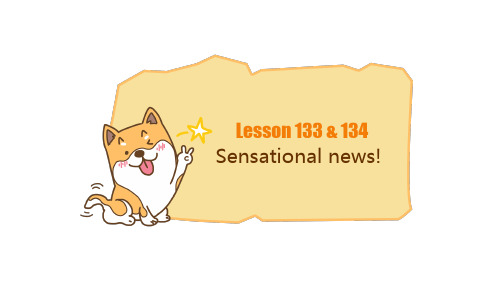
Language Point
语句讲解、课文讲解
同学们 , 请对照教材听老师讲解!
1. Karen Marsh : I have just made ... → She told me she had just...
B : No, not long, but my brother has been in the firm for a long time. 不,我在这里工作的时间不长 , 但是我弟弟在这家公司工作 的时间很久了。
Language Point
语句讲解、课文讲解
疑问句: Have you been working here long? 你在这里工作很久了吗? Do you know her parents long? 你认识她父母很久了吗?
查看答案解析
答案:retire; 解析: 动词辨义. retire v. 退休 , 退职; report v. 报告 , 报导; design v. 设计,计划; desire v. 渴望,向往;要求; 译文:那位老工人决定退休后搬到乡下去。
下一题
根据给出的单词首字母用本课所学单词填空 , 请写出完整单词。 The r_______ was killed because he tried to expose a plot.
adv. 很长一段时间
Warm-up
课前热身
Let's... 让我们···
Let's do sth. Let's = Let us → 表示提议、建议、命令、请求 e.g. Let's go! 我们走!
Listening
裕兴新概念英语第一册笔记:Lesson 133 Sensational new
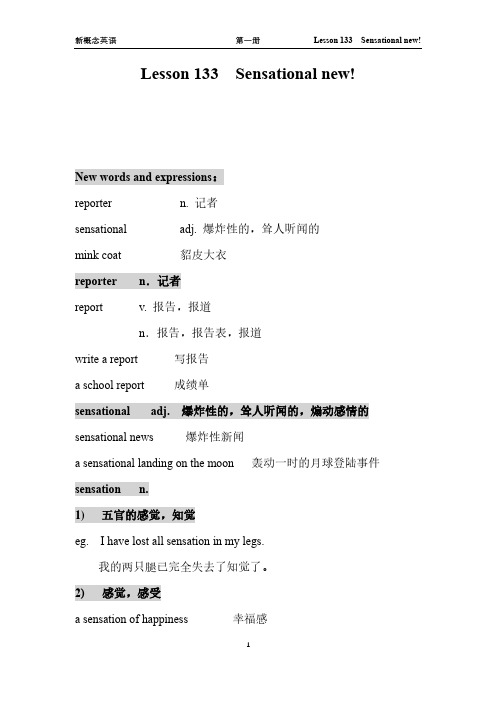
Lesson 133 Sensational new!New words and expressions:reporter n. 记者sensational adj. 爆炸性的,耸人听闻的mink coat貂皮大衣reporter n.记者report v. 报告,报道n.报告,报告表,报道write a report写报告a school report成绩单sensational adj. 爆炸性的,耸人听闻的,煽动感情的sensational news爆炸性新闻a sensational landing on the moon 轰动一时的月球登陆事件sensation n.1)五官的感觉,知觉eg. I have lost all sensation in my legs.我的两只腿已完全失去了知觉了。
2) 感觉,感受a sensation of happiness幸福感have a sensation of faintness 感到好像要昏过去了3) 轰动,轩然大波eg. The news created a great sensation.那个消息起一场轩然大波。
mink coat貂皮大衣mink1) 指貂皮(不可数名词)2) 水貂(可数名词)Text:QuestionWhat reasons did Karen Marsh give for wanting to retire?卡伦・马什说她为什么想要退休?A: Have you just made a new film, Miss Marsh? B: Yes, I have.您刚拍完一部电影吗?马什小姐。
1) to make a film 制作一部影片,拍摄一部电影to shoot the pictures摄影2)have madehave (助动词)+ 过去分词构成现在完成时just “刚刚”,表示动作完成不久eg. I have just come back. 我刚回来。
新概念英语第一册课件--Lesson133--134PPT 不累眼
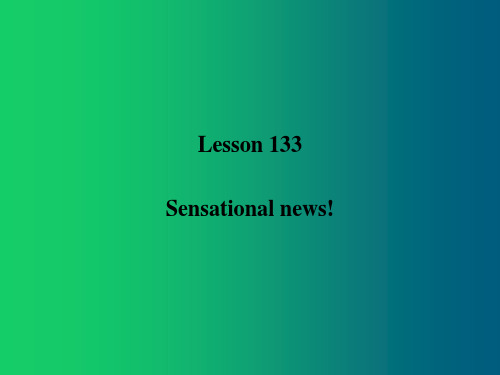
She said, “I have just made a new film.” She said that she had just made a new film. She said, “I'm not going to make another.” She said that she was not going to make another. She said, “I'm going to retire.” She said that she was going to retire.” She said, “ I feel very tired.” She said that she felt very tired She said, “ I don't want to make another film for a
→ He said (that) he left his book in your room.
•( 1 )人称的变化
•She says, “I am a bus driver.” →She says (that) she is a bus driver.
•He says, “My mother will come back tomorrow.” → He says (that) his mother will come back tomorrow.
பைடு நூலகம்
wear 状态 = be dressed in put on 穿上
She told me she had just made a new film. She said she was not going to make another. She said she was going to retire. She told reporters she felt very tired and didn't want to make another film for a long time.
新概念1 Lesson 133 课件

artist 艺术家 dentist 牙医
actress 女演员 waitress 女服务员
visitor参观者
sensational [sen'seɪʃənl] sensation n. adj.爆炸性的;耸人听闻的 1) 五官的感觉,知觉
I have lost all sensation in my legs. 我的两只腿己完全失去了知觉了。 2)感觉,感受 a sensation of happiness 幸福感
间 She said she was not going to make another. 接 She said she was going to retire. 引 She told reporters she felt very tired 语 and didn’t want to make another film for a long time. ‘
arrived at + 小地点 arrived in + 大地点
➢ by 表示动作的执行者,意为“由….”或“被…” ➢ 培根写的一本书 a book by Bacon
‘ Karen Marsh: Sensational News ! By our reporter, Alan Jones. Karen Marsh arrived at London Airport today. She was wearing a blue dress and a mink coat. She told me she had just made a new film.
What reasons did Karen Marsh give for wanting to retire ? Has Miss Marsh just made a new film ? Who was asking her questions ? What is Miss Marsh going to do ? Why doesn’t Miss Marsh want to make another film ? Who bought a newspaper ? Where did Miss Marsh arrive ? What was Miss Marsh wearing ?
新概念一Lesson 133 Sensational news 爆炸性新闻
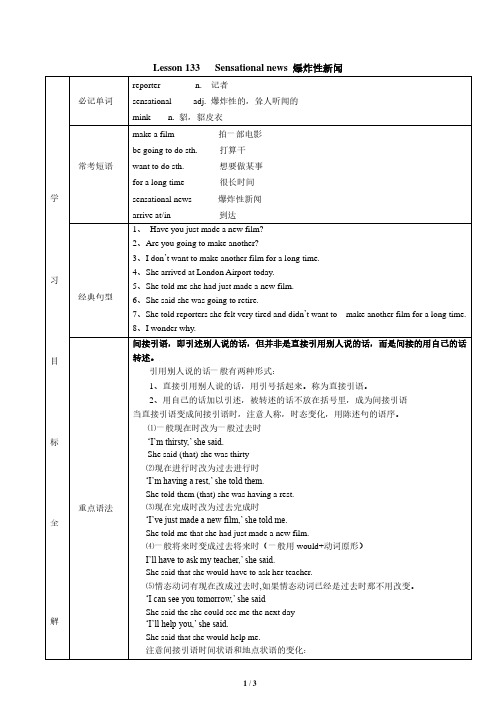
Lesson 133 Sensational news 爆炸性新闻学习目标全解必记单词reporter n. 记者sensational adj. 爆炸性的,耸人听闻的mink n. 貂,貂皮衣常考短语make a film 拍一部电影be going to do sth. 打算干want to do sth. 想要做某事for a long time 很长时间sensational news 爆炸性新闻arrive at/in 到达经典句型1、Have you just made a new film?2、Are you going to make another?3、I don’t want to make another film for a long time.4、She arrived at London Airport today.5、She told me she had just made a new film.6、She said she was going to retire.7、She told reporters she felt very tired and didn’t want to make another film for a long time.8、I wonder why.重点语法间接引语,即引述别人说的话,但并非是直接引用别人说的话,而是间接的用自己的话转述。
引用别人说的话一般有两种形式:1、直接引用别人说的话,用引号括起来。
称为直接引语。
2、用自己的话加以引述,被转述的话不放在括号里,成为间接引语当直接引语变成间接引语时,注意人称,时态变化,用陈述句的语序。
⑴一般现在时改为一般过去时‘I’m thirsty,’ she said.She said (that) she was thirty⑵现在进行时改为过去进行时‘I’m having a rest,’ she told them.She told them (that) she was having a rest.⑶现在完成时改为过去完成时‘I’ve just made a new film,’ she told me.She told me that she had just made a new film.⑷一般将来时变成过去将来时(一般用would+动词原形)I’ll have to ask my teacher,’ she said.She said that she would have to ask her teacher.⑸情态动词有现在改成过去时,如果情态动词已经是过去时那不用改变。
新概念英语第一册133-134课课件-2
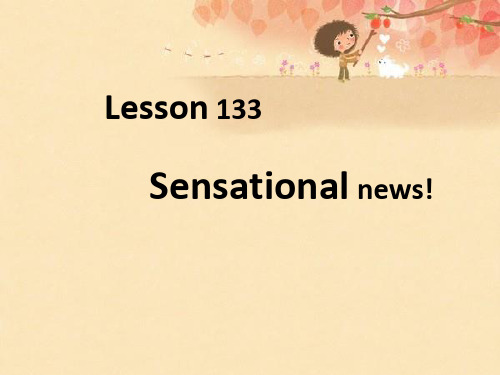
2023/12/15
• 现在时它需改为过去时态;过去时态改为 完成时;过去完成时则保留原来的时态
• 如:1)She said. "I have lost a pen.“ • →She said she had lost a pen • 2)She said. "We hope so.“ • →She said they hoped so. • 3) She said. "He will go to see his friend • "→She said he would go to see his friend
• I arrived in England on Friday. We first arrived at London.
KATE: She was wearing a blue dress and a mink coat. • wear “穿着“ (强调状态) • 她经常穿著绿色衣服
• She always wears green. • put on “穿上“,表“穿上”的动作 • 她穿上外套出去了。
• had just made 过去完成时,表示动作发生在 told这一过去动作之前。
• 他儿子告诉他,他已经做完作业了。
• His son told him that he had done his homework.
• LIZ: wonder why!
• wonder “不知道,想知道”,表示疑惑 • 我不明白谁会这样干 • I wonder who could do this. • 我想知道他是否能成功 • I wonder if he will succeed.
新概念英语NCE1_lesson133-134(共16页)课件
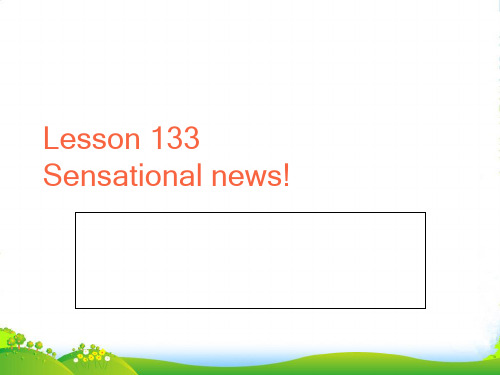
•
③ adj. (口)非常好;给人深刻印象的
• She looks sensational in that dress! 她穿那条裙子 的样子真令人难忘!
• sensational adj. • sensation n .感觉,知觉
• have a sensation of coldness • 激动,轰动一时的时间 a three days’
• She said (that) she could see me the next day.
• 一般现在时要变成一般过去时: • eg. I said, “ I am eight.” - I said that I
was eight. • 现在进行时要变成过去进行时: • eg. I said, “I am reading now.” - I said
that I was reading then. • 现在完成时要变成过去完成时:
• eg. I said,” I have just had lunch.” – I said that I had just had lunch.
• 现在完成进行事变过去完成进行时: • eg. I said,”I have been reading since 9 this morning..” • I said that I had been reading since 9 that
•
① adj. 令人兴奋的;轰动性的
•
The discovery was sensational. 那个发现引
起了轰动。
•
② adj.(贬)耸人听闻的;企图追求轰动效应的
•
The sensational news report didn’t have
新概念英语-第一册-第133-134
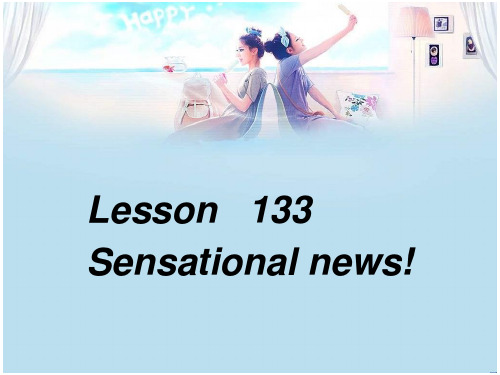
特殊疑问句
保留特殊疑问词做为连接词
语序改为陈述句语序
• He said to me,“What's your name?” • He asked me what my name was. • He asked us, “How many cinemas
have been built in your country?” • He asked us how many cinemas had
• She said (that) she would help me.
• 她说她将帮助我。
• ‘I may return at six o'clock,’ she told me.
• She told me (that) she might return at six o'clock.
• 她告诉我说她可能6点钟回来。
• (1)wonder = want to know 想知道;(表示疑虑)
• (2)wonder 后可以跟
why/what/who/where/when/how 等特殊疑问词 引导的宾语从句。
Grammar in use
• 需改变时态的间接陈述句
•
间接引语里常要改变时态,这是因为原来讲的话与转述这些话之间有一段间隔。
宾 句宾语的人称保 up early”
early
持一致
三 引号内的第三人 She said to me , She told me that
不 称在变间引后去人 “ They want to That they wanted
变 称不变
help him”
help him
直接引语与间接引语的定义
直接引语: 直接引述别人的原话.直接 引语的前后必须加引号。 间接引语: 转述别人的话。间接引语 前后不加引号。
新概念一 Lesson 133 135

★wonder v. 感到好奇
• • • • • • • • • • • ① v. 感到好奇;想要知道 I wonder why he hasn‘t come. I wonder why. 我想知道为什么。 我很想知道他为什么没来。 I was wondering if I could borrow your bicycle. ② v. 感到惊讶(或诧异) She wonders at his rudeness. 她对他的无礼感到惊讶。 I shouldn‘t wonder if she is elected. 如果她当选,我不会感到惊奇。
Let的用法
• let与一般动词不同,它用于动词+ 宾语+ 动词原形结构,即let后面可接 名词或代词,再接不带to 的动词不定 式。(let sb. do)其意思为―允许、让‖ • Just let me try! 就让我试试吧! • Her parents wouldn‘t let her go out with that boy.
• • • • • • • • • • • •
‗George won‘t travel by air,‘he said . ―乔治将不乘飞机旅行,‖他说。→ He said George wouldn‘t travel by air . 他说乔治将不乘飞机旅行。 ‗I may go to the cinema this evening ,‘he said . ―我可能今晚去看电影,‖他说。→ He said he might go to the cinema this evening . 他说他可能今晚去看电影。 ‗I may not retire ,‘he said . ―我可能不退休,‖他说。→ He said he might not retire . 他说他可能不退休。
新概念英语第一册Lesson133Sensationalnews!
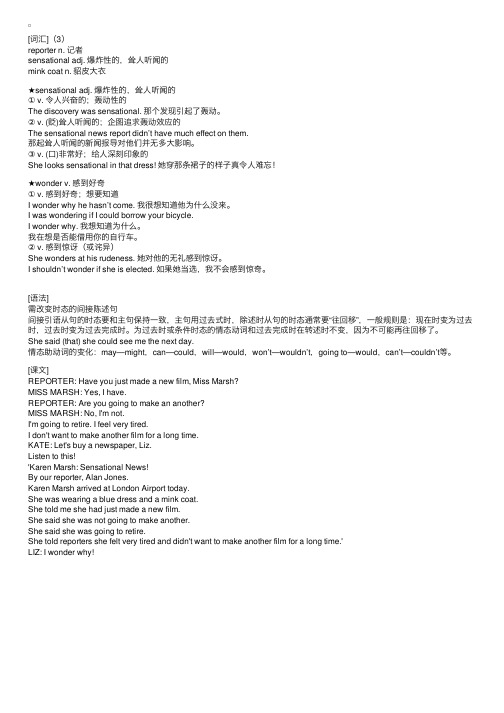
[词汇](3)reporter n. 记者sensational adj. 爆炸性的,耸⼈听闻的mink coat n. 貂⽪⼤⾐★sensational adj. 爆炸性的,耸⼈听闻的① v. 令⼈兴奋的;轰动性的The discovery was sensational. 那个发现引起了轰动。
② v. (贬)耸⼈听闻的;企图追求轰动效应的The sensational news report didn’t have much effect on them.那起耸⼈听闻的新闻报导对他们并⽆多⼤影响。
③ v. (⼝)⾮常好;给⼈深刻印象的She looks sensational in that dress! 她穿那条裙⼦的样⼦真令⼈难忘!★wonder v. 感到好奇① v. 感到好奇;想要知道I wonder why he hasn’t come. 我很想知道他为什么没来。
I was wondering if I could borrow your bicycle.I wonder why. 我想知道为什么。
我在想是否能借⽤你的⾃⾏车。
② v. 感到惊讶(或诧异)She wonders at his rudeness. 她对他的⽆礼感到惊讶。
I shouldn’t wonder if she is elected. 如果她当选,我不会感到惊奇。
[语法]需改变时态的间接陈述句间接引语从句的时态要和主句保持⼀致,主句⽤过去式时,除述时从句的时态通常要“往回移”,⼀般规则是:现在时变为过去时,过去时变为过去完成时。
为过去时或条件时态的情态动词和过去完成时在转述时不变,因为不可能再往回移了。
She said (that) she could see me the next day.情态助动词的变化:may—might,can—could,will—would,won’t—wouldn’t,going to—would,can’t—couldn’t等。
新概念英语一第133课

I don't want to make another film for a long time. want (sb) to do sth. 想要(某人)做某事 She wants me to go with her. for a long time for +时间段表示时间持续的长短,可用于任何时态。 我在那呆了3天。 I have stayed there for 3 days. 我在那住了10多年。 I have lived here for more than 10 years.
Lesson 133 Sensational news!
单词
reporter sensational n. 记者 adj. 爆炸性的,耸人听闻的
minkter
-er 后缀,表示人 -or, -ess(女) , -ee,
n.
learner doctor actress
I wonder why!
wonder “想知道”,表示疑惑
I wonder who could do this.
我不明白谁会这样干。
I wonder if he will succeed.
我想知道他是否能成功。
Let’s buy a newspaper, Liz. 让我们游泳吧!
Listen to this! listen to 听,表听的动作 listen不及物动词,接宾语时必须加介词,构成及物动词
短语。
听,这是什么噪声?你能听到吗?
Listen! What's that noise? Can you hear it?
'Karen Marsh: Sensational News! By our reporter, Alan Jones.
新概念英语第一册133课ppt课件

最新编辑ppt
8
• Let’s buy a newspaper, Liz. • Let’s buy= Let us buy. • Let’s go swimming!
• Karen Marsh arrived at London Airport today. • arrive at 到达,到达一个较小的地方 • arrive in 到达,到达一个较大的地方 I arrived in England on Friday. We first arrived at
London airport.
I saw him just now. Tom told me the new just now.
最新编辑ppt
6
• Are you going to make another? No, I'm not. • another 不定代词
• I’m going to retire. • retire 退休
told这一过去动作之前。 • 他儿子告诉他,他已经做完作业了。
• His son told him that he had done his homework.
• She said she was not going to make another. • She said she was going to retire. • She told reporters she felt very tired and didn't
- 1、下载文档前请自行甄别文档内容的完整性,平台不提供额外的编辑、内容补充、找答案等附加服务。
- 2、"仅部分预览"的文档,不可在线预览部分如存在完整性等问题,可反馈申请退款(可完整预览的文档不适用该条件!)。
- 3、如文档侵犯您的权益,请联系客服反馈,我们会尽快为您处理(人工客服工作时间:9:00-18:30)。
Reporter: Have you just made a new film, Miss Marsh?
Miss Marsh: Yes, I have.
Reporter: Are you going to make another?
Miss Marsh: No, I'm not. I'm going to retire. I feel very tired. I don't want to make another film for a long time.
Kate: let's buy a newspaper, Liz.
Listen to this!
"Karen Marsh: Sensational News! By our reporter, Alan Jones. Karen Marsh arrived at London Airport today. She was wearing a blue dress and a mink coat. She told me she had just made a new film. She said she was not going to make another. She said she was going to retire. She told reporters she felt very tired and didn't want to make another film for a long time."
Liz: I wonder why!
New Word and expressions 生词与短语
reporter
n. 记者
sensational
adj. 爆炸性的,耸人听闻的
mink coat
貂皮大衣
本文参考译文
记者:您刚拍完一部新电影吗,马什小姐?
马什小姐:是的,我刚拍完。
记者:您准备再拍一部吗?
马什小姐:不,我不准备拍了。
我准备退休了。
我感觉累得很。
我早就不想再拍片子了。
凯特:我们买份报纸吧,莉兹。
你听这段:
“卡伦·马什:爆炸性新闻!由本报记者艾伦·琼斯报导。
卡伦·马什今天到达伦敦机场。
她穿着一身蓝色的套装和一件貂皮大衣。
她告诉我她刚拍完一部新片子。
她说她不准备再拍电影了。
她说她准备
退休。
她告诉记者她感到很疲劳,早就不想再拍电影了。
”
莉兹:我很想知道为什么。
【课文】
Reporter: Have you just made a new film, Miss Marsh?
Miss Marsh: Yes, I have.
Reporter: Are you going to make another?
Miss Marsh: No, I'm not. I'm going to retire. I feel very tired. I don't want to make another film for a long time.
Kate: let's buy a newspaper, Liz.
Listen to this!
"Karen Marsh: Sensational News! By our reporter, Alan Jones. Karen Marsh arrived at London Airport today. She was wearing a blue dress and a mink coat. She told me she had just made a new film. She said she was not going to make another. She said she was going to retire. She told reporters she felt very tired and didn't want to make another film for a long time."
Liz: I wonder why!
【课文翻译】
记者:您刚拍完一部新电影吗,马什小姐?
马什小姐:是的,我刚拍完。
记者:您准备再拍一部吗?
马什小姐:不,我不准备拍了。
我准备退休了。
我感觉累得很。
我早就不想再拍片子了。
凯特:我们买份报纸吧,莉兹。
你听这段:
“卡伦·马什:爆炸性新闻!由本报记者艾伦·琼斯报导。
卡伦·马什今天到达伦敦机场。
她穿着一身蓝色的套装和一件貂皮大衣。
她告诉我她刚拍完一部新片子。
她说她不准备再拍电影了。
她说她准备
退休。
她告诉记者她感到很疲劳,早就不想再拍电影了。
”
莉兹:我很想知道为什么。
【生词】
reporter n. 记者
sensational adj. 爆炸性的,耸人听闻的,
mink coat 貂皮大衣
【上期作业回顾】
中英互译。
1)I've heard so much about Egypt, such as the pyramid, the mummy and the Pharaoh.
So I'm going to spend my summer vacation in travelling across Egypt.
关于埃及,我已经听过不少了,像金字塔,木乃伊和法老。
所以,我打算利用暑假游遍埃及。
2) 我奶奶病了,所以我得去医院照顾好她。
My grandma was ill, and I have to take good care of her in the hospital.
My grandma fell ill, so I have to look after her well in the hospital.
3)每天搭公共汽车上学得花费我20分钟的时间。
It takes me 20 minutes to go to school by bus every day.
4)—How are you going to go to Taiwan? By plane, or by sea?
—你打算怎样去台湾呢?乘飞机还是乘船?
—I'm going to go there by air.
—我打算乘飞机去那儿。
二【知识点讲解】
(一)单词扩展
1)reporter n. 记者report v. 报道,报告同时journalist也有记者的意思,但更侧重于新闻工作者。
2)sensational adj. 爆炸性的(sensational news); 轰动的,耸人听闻的(sensational crime)
3)mink coat 貂皮大衣我们常说的皮草(fur coat)
4)retire v. 退休,隐退 retire from 从...上退休我爸爸去年从公司退休了。
My dad retire from his company last year.
(二)【语法讲解】直接引语&间接引语(一)
引述别人的话时,一般有两种方式:
1.引用别人的原话,把它放在括号里;成为直接引语;
2.用自己的话加以引述,被转述的话不放在括号里,成为间接引语。
当直接引语变成间接引语时,注意人称,时态变化,用陈述句的语序。
e.g. ①She said, 'I am very happy to help you."
②She said that she was very happy to help you.
(变化中,人称I→she; am →was)
①"We won't be free."
②The students said they wouldn't be free.
(变化:人称we →they, won't→wouldn't)
注意:
1. 直接引语在改为间接引语时、时态需要做相应的调整。
现在时它需改为过去时态;过去时态改为过去完成时;过去完成时则保留原来的时态。
2.直接引语变间接引语,状语变化有其内在规津,时间状语由“现在”改为“原来”
(例:now变为then, yesterday。
变为the day before)
地点状语,尤其表示方向性的,或用指示代词修饰的状语,由“此”改为“彼”
(例:this 改为that)
三【课后作业】
把下列的直接引语改成间接引语。
1) He said,"My parents visited me yesterday."
2) She said,"I am going to buy a mink coat for winter."
3) Tom said, "I don't know this man."
【作业时间】
1. 我们为大家提供了两种主流英语发音的音频,请大家下载自己喜欢的一种,放到MP3里反复听!(刚开始练习英语听力和口语最好选定一种学习,不要英音美音混淆哦!)
2. 背诵、并默写今天的课文。
实在没有时间的同学就抄写一遍吧。
(部落互动学习本期推出在线录音,希望大家多多开口,我会帮大家做点评)。
